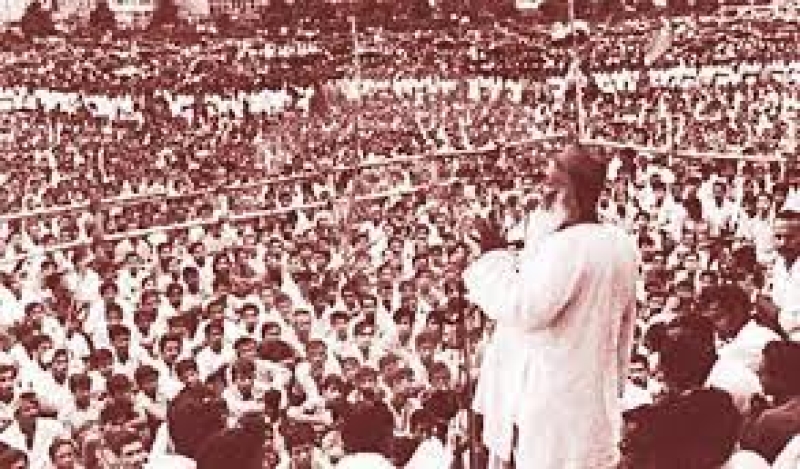- Heads of Sonali Bank, IDRA, and SBC resign citing personal reasons |
- Fakhrul calls attack on Iran 'horrible' |
- AI Moves Closer To Decoding Human Thoughts |
- UNESCO Calls Iran School Strike Grave Violation |
- Oil Jumps, Asian Stocks Slide On Gulf Tensions |
Unite people taking Moulana Bhasani’s lesson to save common rivers: IFC

Farakka Long March. Moulana Abdul Hamid Khan Bhasani addressing a rally Rajshahi Madrasah Maidan at the start of the Historic Farakka Long March on 16 May 1976
The International Farakka Committee (IFC) on has urged the government of Bangladesh and all others concerned to join efforts to protect 54 common rivers and thus save the country’s environment by taking lessons from the historic Farakka Long March organised and led by Moulana Abdul Hamid Khan Bhasani, leader of the toiling masses on 16 May 1976.
In a joint statement issued on Wednesday May 15 to mark the Farakka Long March Day, IFC leaders from New York and Bangladesh paid glowing tributes to Moulana Bhashani whose movement did pave the way for the signing of the 1977 Ganges water treaty ending unilateral withdrawal of water of the river by big neighbour, India.
Now the situation has worsened. With water being diverted from all 54 common rivers the people of Bangladesh are suffering from lack of water in the dry season and either excessive floods in the Teesta or lack of normal rainy season inundation in others like the Meghna and the Ganges basins. Bangladesh shares 57 transboundary rivers, 54 of which come through India, three others from Myanmar.
The 30-year Ganges water treaty of 1996 which will end in two years does not guarantee the flow of the agreed quantum of water to Bangladesh in the dry season as it is silent on water diversion above Farakka point .
In case of the Teesta the entire dry season flow is diverted at Gazal Doba Barrage in West Bengal. In the rainy season on the other hand all the sluice gates of the barrage on the flashy hilly river are opened subjecting the Bangladesh part of the basin to devastating floods and bank erosion. This damages not only crops but also makes thousands of families homeless every year.
Moulana Bhasani’s historic Farakka Long March, done just six months before his death, thus remains relevant even today. The great leader united the people in favour of the demand for due share of water of the Ganges. The people now should get due shares of all 54 common rivers to protect the riverine country from environmental decline, loss of life and livelihoods.
The IFC leaders urged the government to pursue the path of basinwide sustainable and integrated management of the common rivers to keep those alive up to the sea and protect Bangladesh created by them over the millennia.
The signatories to the statement are: Sayed Tipu Sultan, secretary general, Mohammad Hossain Khan, joint secretary general, Ataur Rahman Ata, organizing secretary of IFC New York; Prof. Jasim Uddin Ahmad, president, Syed Irfanul Bari, general secretary of IFC Bangladesh and Mostafa Kamal Majumder, coordinator, IFC.

